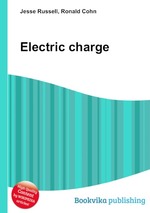Electric charge
Jesse Russell Ronald Cohn
бумажная книга
High Quality Content by WIKIPEDIA articles! Electric charge is a physical property of matter that causes it to experience a force when near other electrically charged matter. There exist two types of electric charges, called positive and negative. Positively charged substances are repelled from other positively charged substances, but attracted to negatively charged substances; negatively charged substances are repelled from negative and attracted to positive. An object will be negatively charged if it has an excess of electrons, and otherwise be positively charged or uncharged. The SI unit of electric charge is the coulomb (C), although in electrical engineering it is also common to use the ampere-hour (Ah), and in chemistry it is common to use the elementary charge (e) as a unit. The symbol Q is often used to denote a charge. The study of how charged substances interact is classical electrodynamics, which is accurate insofar as quantum effects can be ignored.


